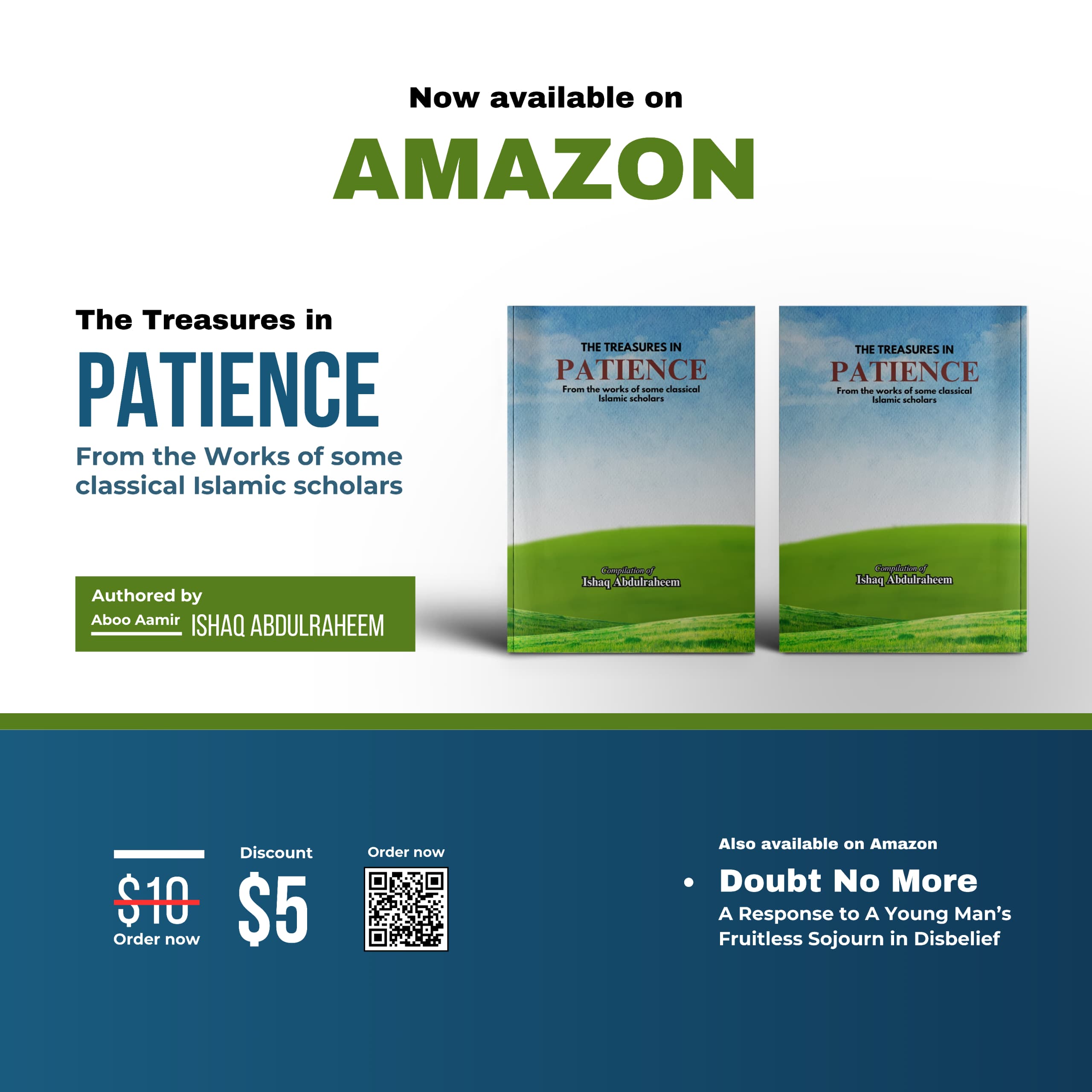Being the English Rendition of the Text of Khutbah Delivered by Al-Ustaadh Tawfeeq Olanrewaju (Aboo Hanoon) on Friday 14th Rabiul Awwal, 1440 (22nd December, 2018) at Masjid Tawheed, Ede, Osun State, Nigeria.
Translation and Transcription by Aboo Ubaydah Ridwan Sanyaolu
All praise is due to Allah, we praise Him, we seek His help and we seek His forgiveness, we seek refuge in Allah from the evils of ourselves, and from the sins of our actions. Whoever Allah guides (to the straight path), there’s no one who can lead him astray, and whoever Allah leads astray, there’s no one who can guide him (to the straight path). I bear witness that there’s none worthy of worship except Allah and that the Prophet Muhammad (Sallaahlaahu ‘alayhi was salaam) is Allah’s slave and messenger.
يَٰٓأَيُّهَا ٱلَّذِينَ ءَامَنُواْ ٱتَّقُواْ ٱللَّهَ حَقَّ تُقَاتِهِۦ وَلَا تَمُوتُنَّ إِلَّا وَأَنتُم مُّسۡلِمُونَ آل عمران: ١٠٢
“O you who have believed, fear Allah as He should be feared and do not die except as Muslims [in submission to Him]”. [Al 'Imran:102]
يَٰٓأَيُّهَا ٱلنَّاسُ ٱتَّقُواْ رَبَّكُمُ ٱلَّذِي خَلَقَكُم مِّن نَّفۡسٖ وَٰحِدَةٖ وَخَلَقَ مِنۡهَا زَوۡجَهَا وَبَثَّ مِنۡهُمَا رِجَالٗا كَثِيرٗا وَنِسَآءٗۚ وَٱتَّقُواْ ٱللَّهَ ٱلَّذِي تَسَآءَلُونَ بِهِۦ وَٱلۡأَرۡحَامَۚ إِنَّ ٱللَّهَ كَانَ عَلَيۡكُمۡ رَقِيبٗا النساء: ١
“O mankind, fear your Lord, who created you from one soul and created from it its mate and dispersed from both of them many men and women. And fear Allah, through whom you ask one another, and the wombs. Indeed, Allah is ever, over you, an Observer”. [An Nisa":1]
يَٰٓأَيُّهَا ٱلَّذِينَ ءَامَنُواْ ٱتَّقُواْ ٱللَّهَ وَقُولُواْ قَوۡلٗا سَدِيدٗا يُصۡلِحۡ لَكُمۡ أَعۡمَٰلَكُمۡ وَيَغۡفِرۡ لَكُمۡ ذُنُوبَكُمۡۗ وَمَن يُطِعِ ٱللَّهَ وَرَسُولَهُۥ فَقَدۡ فَازَ فَوۡزًا عَظِيمًا الأحزاب:٧٠-٧١
“Oh you who have believed, fear Allah and speak words of appropriate justice. He will [then] amend for you your deeds and forgive you your sins. And whoever obeys Allah and His Messenger has certainly attained a great attainment”. [Al Ahzab:70-71]
As for what follows, certainly the most truthful of words is the words of Allah, and the best of guidance is the guidance of the Prophet Muhammad (Sallaahlaahu ‘alayhi was salaam) and the worst of matters are the innovated matters, certainly every innovated matter is Bid’iah, and every Bid’iah is misguidance and every misguidance is in the hell.
Oh You Slaves of Allaah, fear Allaah as he ought to be feared and know that this World is a place of hardship and difficulty, Allaah the all-Mighty says:
يَٰٓأَيُّهَا ٱلۡإِنسَٰنُ إِنَّكَ كَادِحٌ إِلَىٰ رَبِّكَ كَدۡحٗا فَمُلَٰقِيهِ الانشقاق: ٦
“O mankind, indeed you are laboring toward your Lord with [great] exertion and will meet it”. [Al Inshiqaq:6]
Oh You Slaves of Allaah, the Smart and Sensible Muslim for the life of the hereafter prepares from this world, Allaah the all-Mighty says:
وَتَزَوَّدُواْ فَإِنَّ خَيۡرَ ٱلزَّادِ ٱلتَّقۡوَىٰۖ وَٱتَّقُونِ يَٰٓأُوْلِي ٱلۡأَلۡبَٰبِ البقرة: ۱٩٧
“And take provisions, but indeed, the best provision is fear of Allah. And fear Me, O you of understanding”. [Al Baqarah:197]
From those matters compulsory upon the Muslim is to be knowledgeable and acquainted with some of the rulings relating to death, that which is after it. From amongst these rulings is the Wasiyyah (the instructions left behind by the dead) and those matters relating to it. Allaah the all-Mighty says:
كُتِبَ عَلَيۡكُمۡ إِذَا حَضَرَ أَحَدَكُمُ ٱلۡمَوۡتُ إِن تَرَكَ خَيۡرًا ٱلۡوَصِيَّةُ لِلۡوَٰلِدَيۡنِ وَٱلۡأَقۡرَبِينَ بِٱلۡمَعۡرُوفِۖ حَقًّا عَلَى ٱلۡمُتَّقِينَ البقرة: ۱٨٠
“Prescribed for you when death approaches [any] one of you if he leaves wealth [is that he should make] a bequest for the parents and near relatives according to what is acceptable - a duty upon the righteous”. [Al Baqarah:180]
And from the Verses of Inheritance, when Allaah the all-Mighty mentioned the inheritance of the Parents and the children, Allaah the all-Mighty says:
مِنۢ بَعۡدِ وَصِيَّةٖ يُوصِي بِهَآ أَوۡ دَيۡنٍۗ النساء: ۱۱
“After any bequest he [may have] made or debt” [An Nisa":11]
And when Allaah the all-Mighty mentioned the inheritance of the Spouses, Allaah the all-Mighty says:
مِّنۢ بَعۡدِ وَصِيَّةٖ تُوصُونَ بِهَآ أَوۡ دَيۡنٖۗ النساء: ۱٢
“After any bequest you [may have] made or debt” [An Nisa":12]
مِنۢ بَعۡدِ وَصِيَّةٖ يُوصِي بِهَآ أَوۡ دَيۡنٍۗ النساء: ۱٢
“After any bequest he [may have] made or debt” [An Nisa":12]
And when Allaah the all-Mighty mentioned the inheritance of the extended family members (those who are not from the husbands, wives, children, parents of the dead, like the paternal or maternal brothers and sisters), Allaah the all-Mighty says:
مِنۢ بَعۡدِ وَصِيَّةٖ يُوصَىٰ بِهَآ أَوۡ دَيۡنٍ غَيۡرَ مُضَآرّٖۚ وَصِيَّةٗ مِّنَ ٱللَّهِۗ وَٱللَّهُ عَلِيمٌ حَلِيمٞ النساء: ۱٢
“After any bequest which was made or debt, as long as there is no detriment [caused]. [This is] an ordinance from Allah, and Allah is Knowing and Forbearing. [An Nisa":12]
This is a great attention from our Lord the Most High given to the matters of the “Wasiyyah” (the instructions left behind by the dead). For this reason, there are some matters related to it, from them Oh Slaves of Allaah:
It is very important for the Muslim to give great attention to the “Wasiyyah” (the instructions left behind by the dead) especially if He has some matters in which he would like to give instructions on (before his death), as the Prophet Muhammad (Sallaahlaahu ‘alayhi was salaam) have said:
ما حق امرىء مسلم يبيت ليلتين، وله شيء يريد أن يوصى فيه إلاّ ووصيته مكتوبة عند رأسه
It is not from the rights of a Muslim that he sleeps two nights and he has something he would like to give instructions on except that his instructions are written and placed by his head. (Reported by al-Bukhaari and al-Imaam Musim)
The Muslim pays attention to the “Wasiyyah” (the instructions left behind by the dead), for the servant does not know the time of his death, all matters are in the Hands of Allaah the Most High.
Secondly Oh Slaves of Allaah, the scholars of Islam have said that (the writing of) the “Wasiyyah” (the instructions left behind by the dead) becomes more important when death is near, when one engages on a journey, and when dangerous matters happens to an individual. Because of this, the Muslim pays extra attention to his Wasiyyah (the instructions left behind by the dead) when any of these things happens to him.
Thirdly Oh Slaves of Allaah, the Wasiyyah becomes compulsory when it is relating to the security of the corpse such as debts (he owes), or a trust (kept by others in his custody), or debts (others are owing him) in order for people’s rights not to be ruined or destroyed.
Fourthly Oh Slaves of Allaah, it is compulsory upon the dead to give Wasiyyah to His relatives and extended families, those who cannot inherit from his properties, this is from the verse that has been aforementioned.
كُتِبَ عَلَيۡكُمۡ إِذَا حَضَرَ أَحَدَكُمُ ٱلۡمَوۡتُ إِن تَرَكَ خَيۡرًا ٱلۡوَصِيَّةُ لِلۡوَٰلِدَيۡنِ وَٱلۡأَقۡرَبِينَ بِٱلۡمَعۡرُوفِۖ حَقًّا عَلَى ٱلۡمُتَّقِينَ البقرة: ۱٨٠
“Prescribed for you when death approaches [any] one of you if he leaves wealth [is that he should make] a bequest for the parents and near relatives according to what is acceptable - a duty upon the righteous. [Al Baqarah:180]
This verse has been abrogated by the verses of Inheritance, they have the compulsory rights in the inheritance of the dead but the Wasiyyah are for those who cannot inherit the dead as the Prophet Muhammad (Sallaahlaahu ‘alayhi was salaam) said in His Pilgrimage:
إن الله قد أعطى كل ذي حقٍ حقَه، فلا وصية للوارث
Verily Allaah has given all rights to their rightful owners, there is no Wasiyyah for those will inherit (the dead).
This Oh Slaves of Allaah, paying due attention to the matters of the Wasiyyaah is compulsory and to be careful of all those matters that goes against the commandments of Allaah the Most High in the Wasiyyah, there should not be inconveniences in it, Prophet Muhammad (Sallaahlaahu ‘alayhi was salaam) said:
لا ضرر ولا ضرار، من ضارّ ضارّه الله، ومن شاقّ شاقّه الله
'There should be no evil not recompensing with evil. Whoever causes harm. Allaah will cause harm to him, whoever causes difficulty, Allaah will cause difficulty to him.'
As it has been established in the Traditions of the Prophet Muhammad (Sallaahlaahu ‘alayhi was salaam), also the Wasiyaah should be limited to 1/3 to those who are close relatives and those other than them, this is from goodness. The best is for the Wasiyyah to be limited to 1/3 of one’s property as the Prophet Muhammad (Sallaahlaahu ‘alayhi was salaam) said to Sa’ad bn Abii Waqaas (may Allaah be pleased with Him):
فالتلت، والثلث كثير، إنك أن تدع ورثتك أغنياء خير لك من أن تدعهم عالةً يتكفّون الناسَ. رواه أحمد ومسلم وأصحاب السنن.
So one third, one-third id much, verily for You to leave your inheritors wealthy is better for you that to leave them poor, (making them) beg from the people. Reported by al-Imaam Ahmad, Muslim and in the Sunan.
Because of this Oh Slaves of Allaah, making Wasiyyah for the generality of the Muslims and the path of goodness are from acts of goodness, because Prophet Muhammad (Sallaahlaahu ‘alayhi was salaam) said:
إذا مات الإنسان انقطع عنه عمله ألاّ من ثلاث، إلاّ من صدقة جارية، أو علم يُنتفع به، أو ولد صالح يدع له.
When the Son of Aadam dies, His actions are severed from Him except three, except from a flowing charity, knowledge which is benefitted from, a righteous child praying for him.
All praise is due to Allah, we praise Him, we seek Allaah’s Blessing and Salutation upon the Prophet Muhammad (Sallaahlaahu ‘alayhi was salaam), His Household, His Companions and those who follows His path. Oh Slaves of Allaah, the scholars of Islam have said that a Muslim when he notices ignorance among his close relatives and extended families, leaning towards innovations in the Religion, it is appropriate for him to leave instructions for them in His Wasiyyah, he should warn them against everything that opposes the Commandments of Allah the Most High, because Allaah the Most High have said:
يَٰٓأَيُّهَا ٱلَّذِينَ ءَامَنُواْ قُوٓاْ أَنفُسَكُمۡ وَأَهۡلِيكُمۡ نَارٗا وَقُودُهَا ٱلنَّاسُ وَٱلۡحِجَارَةُ الـتحريم: ٦
"O you who have believed, protect yourselves and your families from a Fire whose fuel is people and stones" [At Tahrim:6]
Some of the Companions of the Prophet Muhammad (Sallaahlaahu ‘alayhi was salaam) such as Sa’ad bn Abii Waqaas and Aboo Moosa al-‘ash’ari (may Allaah be pleased with them both) instructed (their relatives) to follow the Commandments of Allaah (in their burials) and warning them to avoid innovated matters in the Religion, and others.

